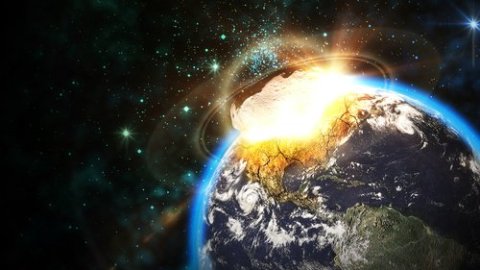Asteroid 2012 DA14 Won’t Kill Us (Yet), But Ought to Scare Us Into Action

The near earth asteroid 2012 DA14 discovered last year is not going to hit Earth next year, scientists say. Phew. And yet, it will still be coming in way too close for comfort (17,000 miles away–closer than many orbiting satellites), and may hit us the next time around, in 2020, or on another orbit in the more distant future.
This threat, which would have the impact of a thermonuclear bomb, ought to sufficiently scare us into contemplating several courses of action:
1. Watch the skies
Imagine if 2012 DA14 had been on course to hit us. We would have been caught with our pants down. There was insufficient time to build a spaceship capable of colliding with the asteroid to destroy it or bump it off course, a project that experts say would have taken two years. We need a better early warning system to detect the next gloomy discovery and give ourselves a fighting chance. Right now, when we detect an asteroid with a telescope we learn its position, but it is harder, and takes longer, to nail down its orbit. That is still the case with 2012 DA14, which astronomers are keeping a close eye on.
2. Invest in technology to stop an asteroid
There are many different ideas about how to stop an asteroid, which range from destroying it (with a nuclear device, for instance) to changing its course. The latter action would require hitting it with a kinetic interceptor or using a bit of “solar powered orbital mechanics” that involves painting (yes, painting) the asteroid white to change the ratio between reflected and absorbed radiation. We could also strap a rocket to the space rock to steer it away from us or “tow” it away with a “gravitational tractor.” Others have suggested solar sails, “giant mirrors that fly through space via the force of sunlight reflecting off them.”
While some of these ideas may seem far-fetched, at the very least we ought to give the best ideas their day in court right now, as we will only get to do this experiment once.
In the worst-case scenario, we would need to be prepared for the event of an asteroid making impact, in which case we would need to figure out ways to move large populations and possibly develop a fair lottery system for what would be much coveted space in the bunker. Some people, of course, may choose to accept our fate, if not embrace it, when the doomsday event draws near. On the other hand, experts such as Stephen Hawking have suggested that we need to be prepared to abandon Earth altogether, which would require the construction of a space colony.
Watch Stephen Hawking in this video here:
Image courtesy of Shutterstock
Follow Daniel Honan on Twitter @Daniel Honan





